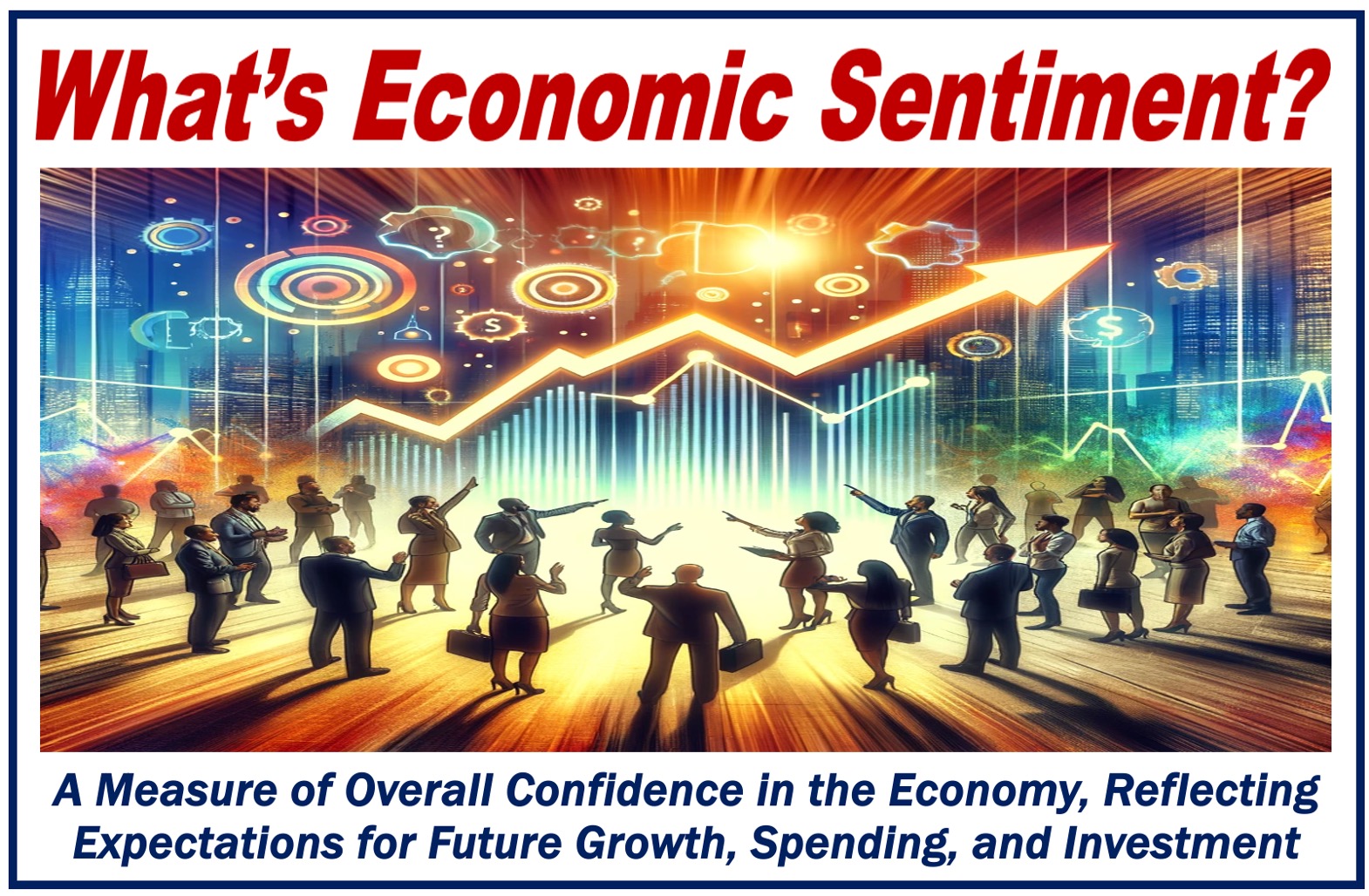Economic Sentiment refers to how people and businesses view the overall economy at the moment. It encapsulates how individuals feel about their financial prospects, job and career prospects (depending on age), and the general economic situation, both now and in the future.
This sentiment plays a crucial role in guiding economic decisions, such as spending, saving, and investing, reflecting the collective mood towards the economy’s current and future state.
Tradingpedia.com has the following definition of the term:
“Economic sentiment is measured by indicators which reflect the optimism or pessimism that business managers or households feel about the prospects of economic conditions in a country or region. It also provides an overview of how people foresee the economy.”
Economic sentiment – a compound noun
A compound noun is a term that consists of two or more words. “Economic sentiment” is a compound noun consisting of the words “economic” and “sentiment.” Let’s have a look at their separate meanings:
- Economic
The term “Economic” pertains to the economy; a system by which a society organizes the production, distribution, and consumption of goods and services to meet its citizens’ needs and desires.
- Sentiment
“Sentiment” refers to an individual’s feelings, thoughts, or attitudes towards a particular situation, event, or subject, often influenced by personal experiences and cultural backgrounds.

Surveys
To understand economic sentiment, we must look at various indicators. Surveys regularly gather data on how people feel about economic conditions.
These surveys might question people about their perceptions regarding inflation, economic growth, job prospects, and interest rates. Their answers provide us with a snapshot of the public’s confidence in the economy.
Why economic sentiment matters
How people and businesses feel can have a significant impact on the economy.
Consumers are more likely to spend money if confidence is high, and businesses are more inclined to invest in new projects. In such circumstances, the stock market also tends to perform well.
When economic sentiment is low, however, people and companies tend to spend and invest less, which may undermine economic growth.
Governments, central banks, businesses, investors, policymakers, and financial analysts monitor economic sentiment closely.
Positive sentiment suggests that the economy is doing well. However, overly optimistic sentiment may lead to rising inflation. Conversely, negative sentiment may forewarn of an impending economic downturn.
Policymakers use economic sentiment data to adjust monetary and fiscal policies. Monetary policy, controlled by the central bank, focuses on interest rates and money supply. Fiscal policy, the government’s responsibility, concerns taxes and spending.
Effects of economic sentiment
Economic sentiment can influence house prices, the job market, national currencies, stock market trends, consumer spending, business investments, and interest rates.
A fall in consumer confidence, for example, might reduce spending, which could lead to lower sales for businesses, which in turn may slow down hiring, or even trigger job cuts.
When driven to extremes of fear and panic, customers can bring a bank to its knees. In 2007, thousands of customers began withdrawing their money from Northern Rock in the UK. The bank run nearly destroyed the bank. A bank run is a mass withdrawal of deposits by customers fearing insolvency. This bank run was the first in the UK in over 150 years.
Other compound nouns
There are many compound nouns related to people’s or business’s confidence or sentiment. Here are five of them, their meanings, and an example of each one in a sentence.
-
Consumer Confidence
Indicates consumers’ optimism or pessimism about their own financial situation and the overall economic outlook.
Example: “A rise in consumer confidence suggests that people are more willing to spend money.”
-
Business Sentiment
Reflects the current outlook and future expectations of the business sector.
Example: “Positive business sentiment is often seen as a precursor to economic expansion.”
-
Market Sentiment
Captures the overall attitude of investors toward specific markets or the financial market as a whole.
Example: “The stock market rallied today, buoyed by optimistic market sentiment.”
-
Investor Sentiment
Describes the general mood or attitude of investors towards the financial markets.
Example: “Investor sentiment has turned bearish, leading to a sell-off in equities.”
-
Economic Confidence
A broader term that encompasses confidence in the economy’s current and future state across all sectors, not just consumers.
Example: “High economic confidence typically leads to increased investment and consumption.”
Final thoughts
Economic sentiment is more than just feelings about the current economy. It is an important indicator that reflects the health of the economy. It influences economic decisions, both at the individual and collective levels.
